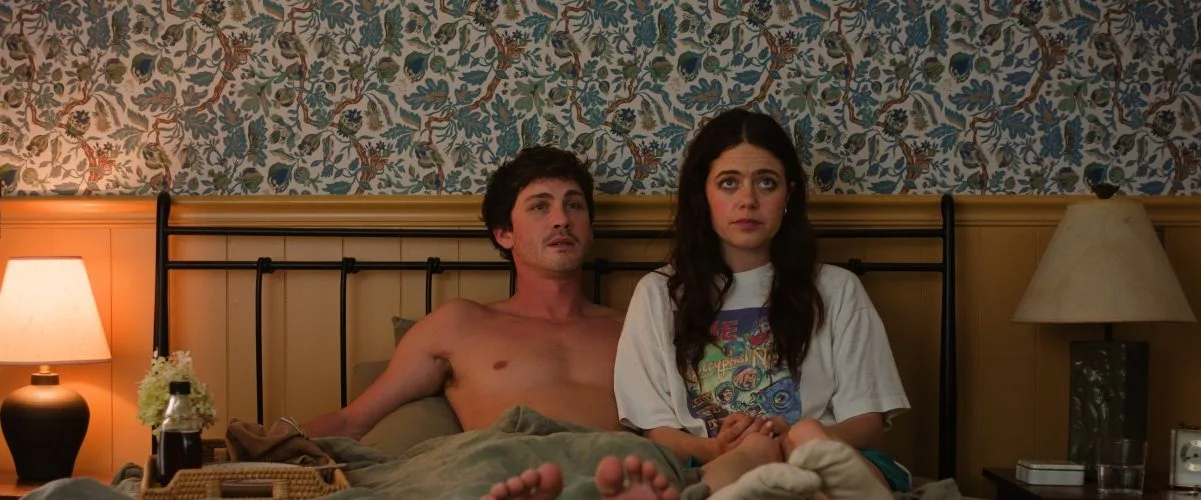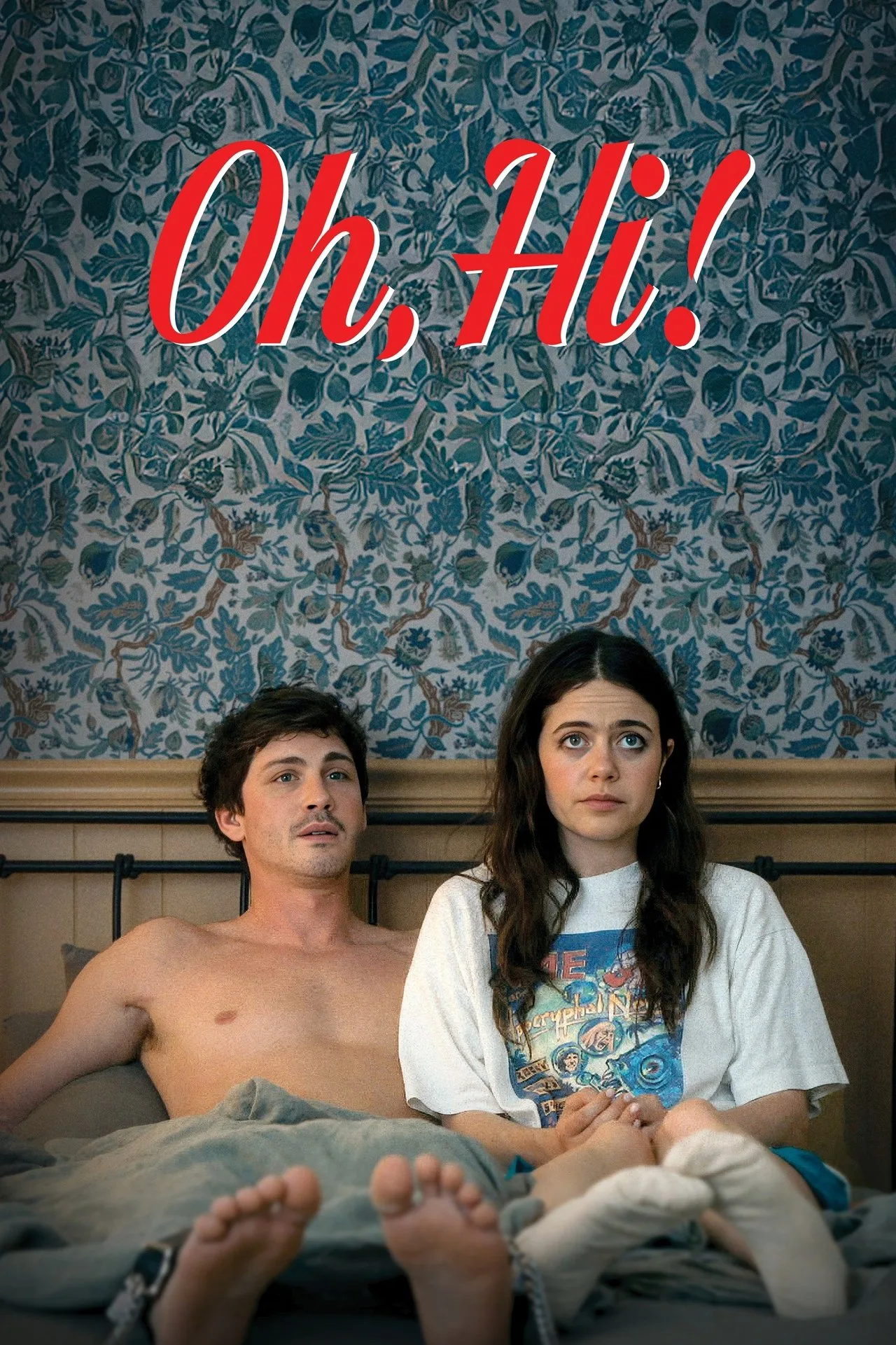In director Sophie Brooks’ “Oh, Hi!,” everyone wants to be loved, but no one wants to communicate. That’s the thorny conflict from which this slippery chamber piece spins its wild premise. It flirts with melodrama, but it’s never quite as histrionic as other films of its ilk, and that’s because it’s anchored by an earnest inquisition–mainly around the isolating nature of modern relationships–that keeps it focused as it sifts through its various tones. It works best in conversation with projects across this year, like “Materialists,” “Splitsville,” and even “Together,” which have dramatized the angst of the commitment-phobic into tales of destabilizing dread. It’s a deeply human experience to long for someone who’s unavailable and to treasure a love that’s true but can’t last. “Oh, Hi!” ruminates on this to somber yet entertaining effect.
Brooks shifts between genres, offering intrigue as her narrative evolves. The first scene could be taken out of any rural slasher movie, where Iris (Molly Gordon) stares blankly in wide-eyed panic in a cozy rental home. She’s visited by her friend, Max (Geraldine Viswanathan), who asks what’s wrong. As we hear the cries of someone else in the house, at this point, we’re not sure whether Iris is a victim or a perpetrator. The film then flashes back in time to thirty-three hours earlier, where we see Iris and her partner, Isaac (Logan Lerman), on the road. The ambience and tone are completely different here; it’s effervescent and rife with possibility, and the two sing a Dolly Parton song together in mismatched harmony. The two have taken their first weekend trip together, and we have the privilege of luxuriating in the rhythms of their relationship. Once the two arrive at the rental home, the kitchen, nearby lake, and bedroom just become further ways for them to express their obvious affection for each other. The two move with an ease and security within each other, which is all a clever misdirect as things take a turn for the kinky and calamitous.
Iris and Isaac discover BDSM appliances in a locked closet, and Isaac willingly allows himself to be tied up to the bed to try something new together. After sex, Iris comments that she’s excited that they could go on “our first trip as a couple,” and Isaac’s mood sours instantly. He swears that she’s mistaken, that he’s not looking for a relationship, and that he’s been sleeping around with other women. In hindsight, it’s probably foolish to share such revelations in rapid succession whilst tied up. In anguish and frustration, Iris leaves Isaac shackled. She then plans to spend the next twelve hours trying to convince Isaac that he does, in fact, want to be with her. All the while, Isaac becomes increasingly disturbed by her clingy fervor.
While Brooks’ film could have veered into more of a horror/thriller route, the gag of being chained only serves as a plot device to get at the questions that Brooks and Gordon (who has a story credit) have percolating. Isaac’s confinement means he has to listen to Iris rather than retreat and be avoidant. The duo’s conversations act as a tidy way to distill the film to its most irreducible provocations. They discuss whether you can expedite the process of love and how seeking fluidity in a relationship is healthy and normal, but it can also be a double-edged sword because it results in uncertainty, and it’s hard to have intimacy amidst instability. It never feels like pontificating, if only because it reminds me how couples probably spend less time having these explicit heart-to-hearts as much as they should. In the bustle and noise of modern life, it can be easy to settle into an assumed shorthand with your partner, and you can spend time in someone’s presence without asking any point-blank questions. It shouldn’t take being tied down, but sometimes that’s the only way to get answers.
Visually, Brooks and cinematographer Conor Murphy make excellent work of their single setting, particularly in how they reframe how the environment one finds themselves in after a painful emotional rift can destabilize and haunt. When Iris and Isaac first head up to the rental house, their confinement is intimate; the two can cook, swim, and make love freely, getting lost in one another in such a way that the hours pass by rapidly. After Isaac tells Iris that he’s not looking for a girlfriend, Murphy’s camera traces and juxtaposes Iris walking through the house again with Brooks showing the same establishing shots we saw prior; now the annals of the house have been rendered more horrific, even if it’s the same place.
It can be a lot to spend time in the headspace of Iris and Isaac, but Lerman and Gordon find the pathos in their characters; they could have just embodied the “asshole boyfriend” and “crazy girlfriend” archetypes but opt for more complexity. Isaac spends most of the film fettered to the bed, and Lerman laces his performance with enough self-awareness that enables us to laugh at him for his predicament. The idea of someone afraid of commitment having to remain siloed in place through the night is a rife juxtaposition to mine, and Lerman plays Isaac as a sort of fuckboy Prometheus, whose ego and passivity are being picked apart by the eagle of Iris’ doubts, anger, and desperation.
Gordon’s performance is equally captivating. She excels in delivering the snarky, self-aware confidence and ennui that’s been a staple across films like “Shiva Baby” and “Good Boys,” but she’s also able to sell Iris’ more extreme emotions. There’s a sympathy for Iris’ desperation to cling and fight for something that was falsely real rather than the uncharted territories of acknowledging a break-up. Viswanathan, who brought her sardonic chops to projects like “Blockers” and “Drive-Away Dolls,” doubles down on those sensibilities here, and her enabling energy to Iris’ scheme is matched by Josh Reynold’s, who plays her Max’s boyfriend Kenny to pitch-perfect incredulity.
There’s a wordless exchange between Isaac and Iris that distills the film’s effectiveness. After Isaac first says that he’s “not looking for a relationship,” Iris zealously shows the receipts, as if trying to convince herself that she wasn’t misreading the signs. “I like you and you like me. We should definitely not stop seeing each other,” she says as a final plea. When her words fall on indifferent ears, Gordon lets the mix of shock and grief sit on Iris’ face for a moment too long for comfort. You can almost hear Iris’ visage scream “not again,” as if her history of commitment-phobic partners has been conjured into the room with her. There’s a crushing despair in coming to terms with the fact that the person you gave your heart to didn’t value you in the same way you valued them. “Oh, Hi!” is full of laugh-out-loud moments, but it thrives in the ways it embodies quiet, shattering devastation.




















